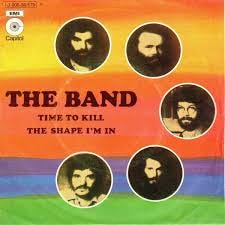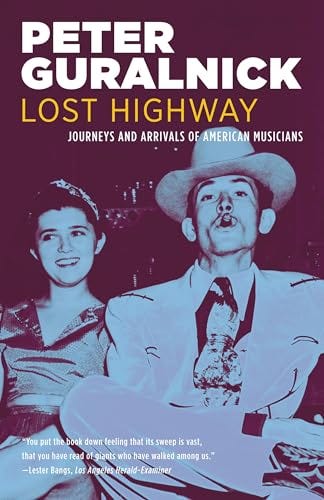Your correspondent is sitting on the couch on Saturday afternoon while last-minute, going-out-shopping preparations are being fine-tuned at the other end of the house. I’m flipping through YouTube, always a worthwhile past time, and I come upon a rare video clip of The Band playing in Pittsburgh in 1970, a show recorded for Dutch TV for some reason known only to Netherlanders.
Since I love The Band, I’m curious to see what song they’ll start with and they surprise me, opening with a somewhat lesser known song called “Time To Kill.” Though I hadn’t heard that particular Band song in a very long time, maybe 20-30 years, what surprised me was that I KNEW ALL THE WORDS.


That gave me pause. Evidently, somewhere along the way years and years ago, the little gremlins up there between my ears took down all those words on a day when I must have been playing The Band’s “Stage Fright” album. Apparently word came down from on high or whoever runs that shop up there that IT WAS IMPORTANT FOR ME TO REMEMBER THESE LYRICS. I might need them, oh, 30 years later.
My 2024 question is - WHY? It’s an OK song, certainly not one of my top 20 Band numbers, but there were those lyrics, rolling off my tongue on Saturday afternoon. As I sat there thinking about it, considering the enormous record collection I have, plus hundreds of CD’s, bunches of DVD’s and hundreds of cassettes, how many song lyrics are already tucked up there? And more importantly, WHY?
With remembering Bob Dylan lyrics, hell, I’ve written three books about the guy and his songs, so that would make sense. But “Time To Kill”? It got me thinking about whether or not my 55-years (or so) as a writer has conditioned my brain to latch onto some things and not others. Or, is it just plain weirdness?
Is there something about tying words and music together that somehow insidiously finds its way into our memory banks, whether we’re conscious of it or not? It’s not like I ever sat down with a songbook and said “I’m going to remember every single lyric the Beatles wrote” but I’d bet you if you put a record on, I could sing along with it. Surely, that can’t be just me. But WHY does our brain latch onto that sort of stuff?
Let me give you another example. A few days ago, I wrote about the “magic” of writing a book, a post where I talked about seeing my “Last Time Out” book on the shelf at Barnes & Noble and what it made me think of and remember. It was a very well-received post, some 284 views and a boatload of comments, which I always treasure. It seemed to really connect with my readers, which is always the goal.
But as I am winding down writing the column — which, by this point does have an established theme that tries to capture/hint at/suggest the “magic” that sometimes seems to happen when you’re writing — out of the stone cold blue, my brain remembers something the noted author Mitch Albom wrote to me on inside jacket of his phenomenal “Tuesdays With Morrie” years and years ago.
It was a quote that put the absolutely perfect ending on the post that evidently connected with so many of you. “Thanks for the many hours of shared conversation and love of writing,” Mitch wrote. “I hope this book shows you, as it did me, what magic we all have inside us.”
Now I can tell you that I don’t think I’ve looked at that book or that inscription since we moved here from Michigan 32 years ago. Yet somehow, all these years later, as I’m sitting here writing, automatically, my brain’s filing cabinet shifts into gear and brings up this gem. “Hey, knucklehead!,” it seems to say to the front part of my brain, “Don’t forget this! This is perfect, ain’t it?” And it was.
Same thing when I was writing about Elvis Presley. At least 30 years earlier, I’d read Peter Guralnick’s wonderful “Lost Highway,” a collection of his essays on various music legends (and near-legends) and there was a country singer who talked about seeing the young Elvis Presley, before he became famous and just how damn exciting it was. I remembered it, tracked it down years and years later and used it.
As Peter Guralnick recounts in his superb book “Lost Highway,” country singer Bob Luman could see what was happening with the young Elvis and shared it with writer Paul Hemphill.
“This cat came out in red pants and a green coat and a pink shirt and socks and he had this sneer on his face and he stood before the mike for five minutes, I’ll bet before he made a move. Then he hit his guitar a lick, and he broke two strings. I’d been playing ten years and I hadn’t broken a total of two strings.
“So, there he was, these two strings dangling, and he hadn’t done anything yet and these high school girls were screaming and fainting and running up to the stage, and then he started to move his hips real slow like he had a thing for his guitar. That was Elvis Presley when he was about nineteen, playing Kilgore, Texas.
“He made chills run up my back. Man, like when your hair starts grabbing at your collar. For the next nine days he played one-nighters around Kilgore, and after school every day me and my girl would get in the car and go wherever he was playing that night. That’s the last time I tried to sing like Webb Pierce and Lefty Frizzell.”
Don’t get me wrong, I’m not complaining. But I do wonder HOW and WHY that kind of thing happens. At times, though, it’s a bit startling. What is it about the process of writing that seems to get you unconsciously (or consciously) ferreting around in your brain for things that, geez, you might have read ages ago? And it just happens. It’s not like I’m sitting there in mid-composition wondering if there’s something I read a long time ago would fit here. It just pops in, unannounced. Does this happen to other people, too? Or is it just me.
Last summer, I was writing a chapter in my upcoming baseball book “Diamond Duels” comparing Joe DiMaggio and Ted Williams and I did a ton of research on the two. In the middle of the writing, I was sure I remembered reading a quote from the great David Halberstam about how difficult DiMaggio could be dealing with the New York media. I seemed to remember it was in the Introduction of “The Best American Sportswriting Of The Century” an enormous book which came out back in 1999.
I doubt if I read much from it over the past 15 years, especially once I started teaching. But that DiMaggio quote stuck with me. When I went back to the book, sure enough, it was right where I remembered it was.
Now, it was a great and pertinent quote but when I first read it all those many years ago, I had no plans of writing Word One about Joe DiMaggio. Did my brain anticipate it? Weird, huh?
There is no way to measure just how many things I’ve read since I learned to read before first grade. And similarly, there’s no way that I know of to measure or discover what STUCK and what has to be the 99% of the rest that passes on through and is mercifully forgotten.
Now if you’re an active reader, it may not be all that weird to have these things pop up in your head over the course of your life. And I’m sure I’m not alone in remembering song lyrics, though I’m quite sure few of us would be up to mid-period Dylan lyrics like “Desolation Row” or “Sad-Eyed Lady of The Lowlands” or “It’s All Right, Ma.” Not only remembering but DELIVERING those words with conviction, that was one thing that struck me, hearing the acoustic portion of the 1974 show I saw in Boston. But performing those songs so many times over so many years, you could see how they might sink in. Sort of mental muscle memory.
What truly interests me is WHY we remember some things and not others. What is it in our brain that understands — evidently at a level we cannot explain or grasp — what to hang onto and what to let go? When I read that Halberstam introduction at least 25 years ago, what made my brain say “Hey, junior. Remember that DiMaggio quote, you might need it some day.”
If you think of your brain like a sea bed (Mine has a lot of plankton, I’m sure), what leaves an impression on the floor and what doesn’t? Better yet, what leaves an impression that you don’t even seem to understand or know about? Then you find yourself writing one afternoon, getting to the end of the story and BANG, an idea, a quote, a moment, reports for duty, one that fits in perfectly with what’s already been written. Is that luck? Creativity? A brain already bent out of shape with so much reading and writing?
I don’t know and don’t think I ever will. And neither, I’ll wager, do you.




I think we remember on at least two levels perhaps more and depending on how the event impacted us. It may be how the brain is wired, so we have a better chance to survive. Part of the ‘inborn’ basic genetic toolkit, thanks to uncounted generations of our ancestors who struggled and lived long enough to produce offspring and pass their tools down .
Remembering Mark Twain, (I’m paraphrasing here) saying how “I can remember everything, whether it happened or not,……soon it will be only the later,….” 🤣
Memory is a mysterious thing. I've had similar experiences as I write my memoir. And then again, I believe I remember something so well, and when I do my research, I find out I am wrong. Good luck on your latest book!